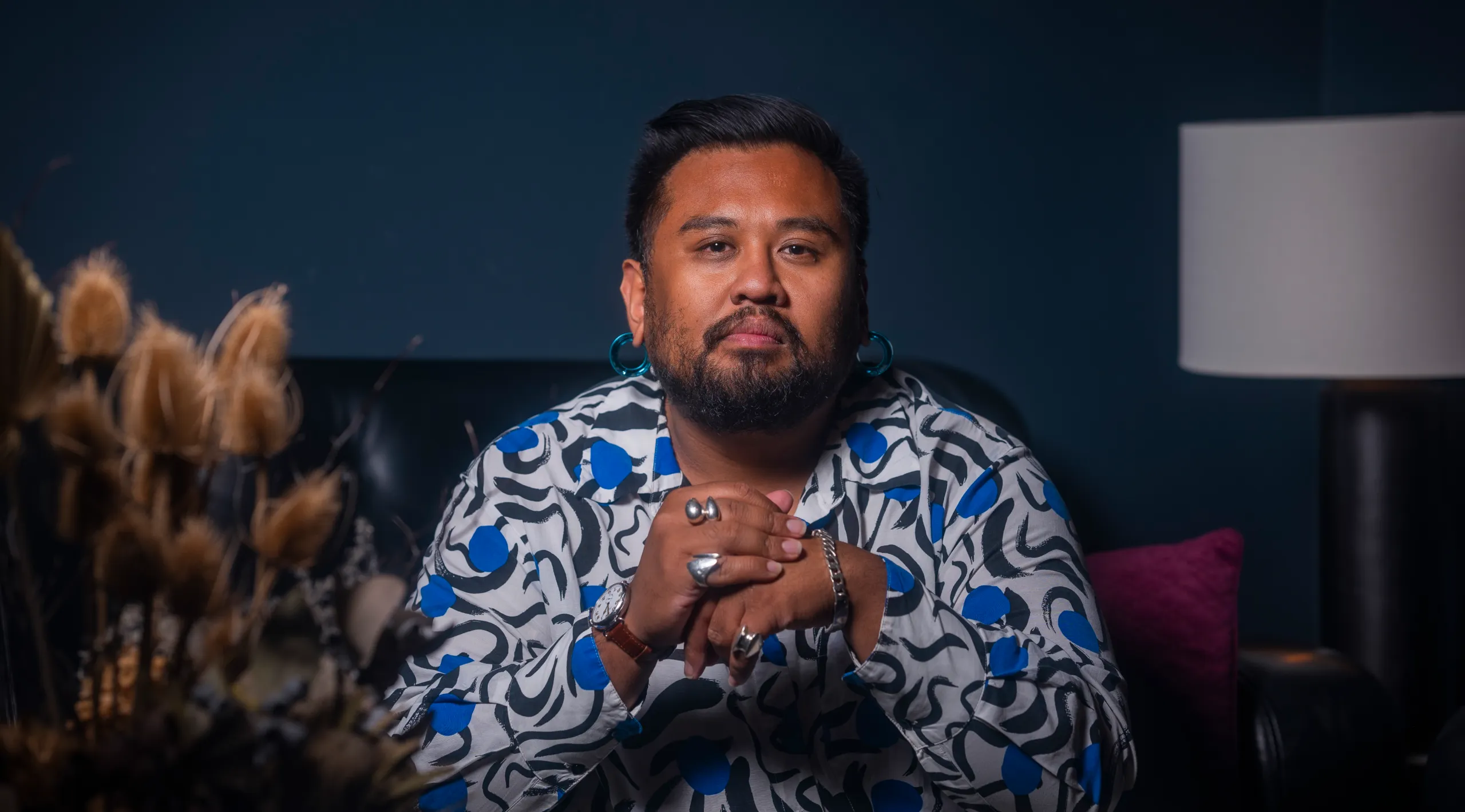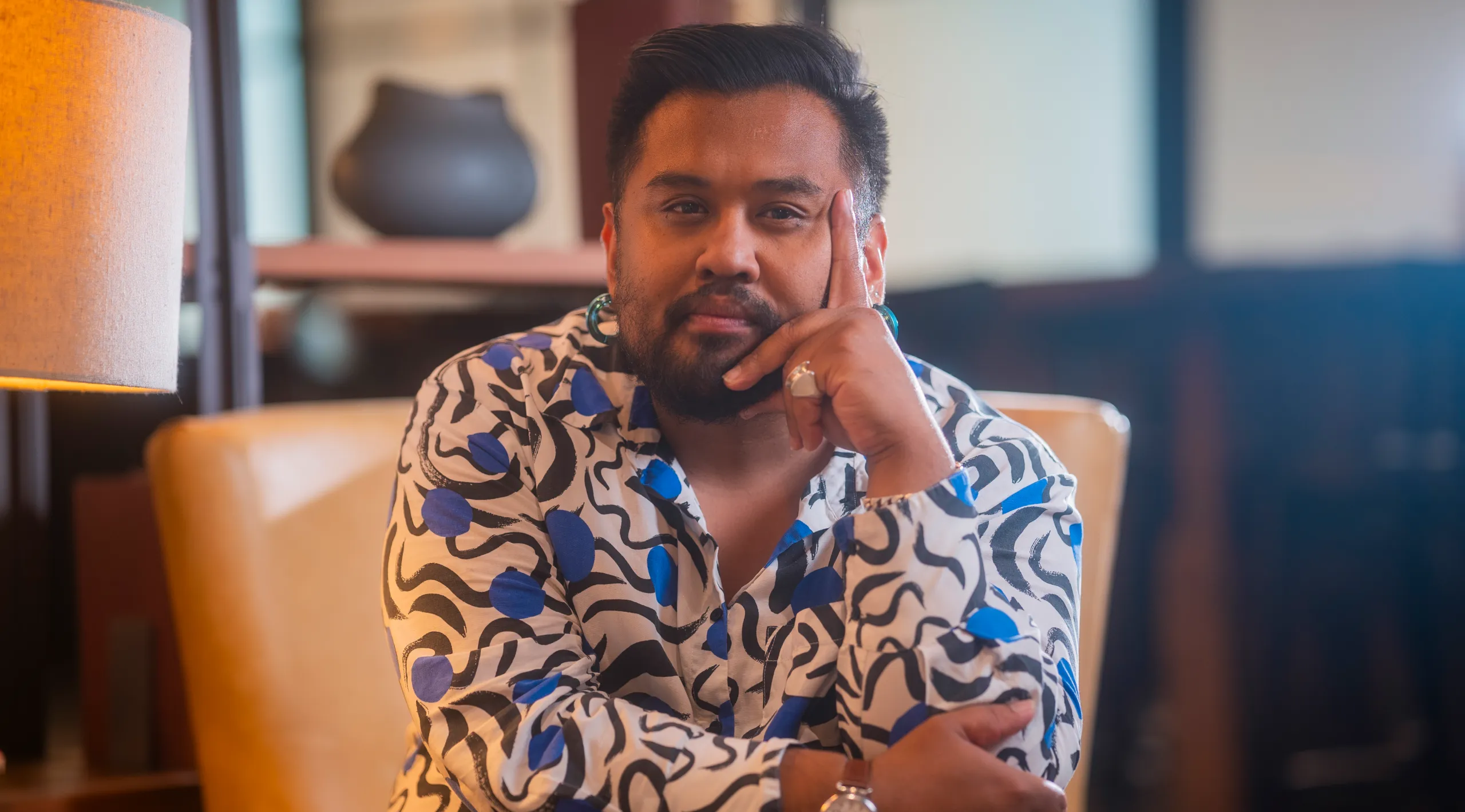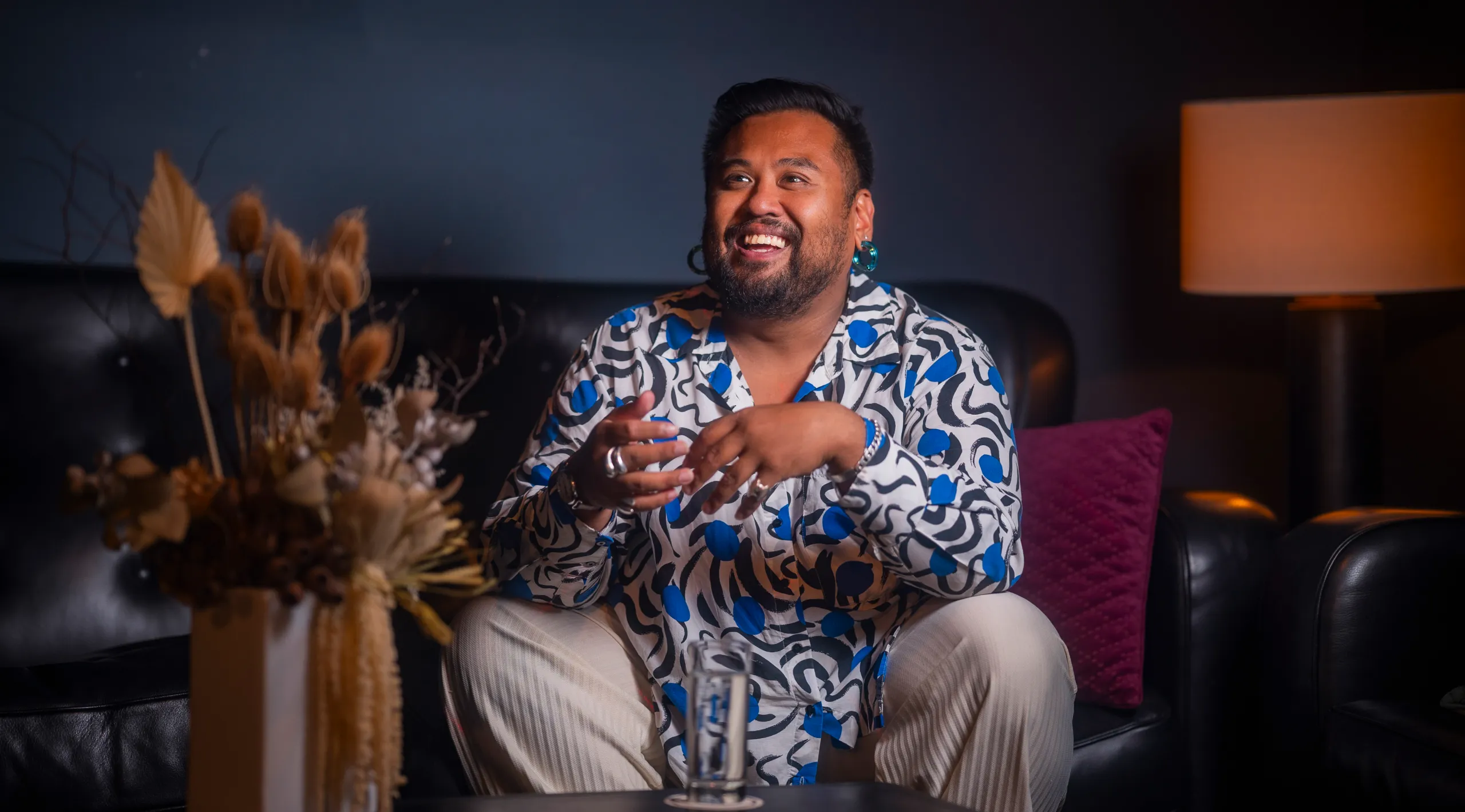Giancarlo de Vera leads BEING, NSW's peak consumer advocacy organisation representing people with lived experience of the mental health system.
As a queer, nonbinary person of colour with lived experience of mental health services, they’re challenging who gets to make decisions about our care—and why we shouldn’t accept "what's best for us" from people who've never walked in our shoes.
In this interview, we discuss how lived experience advocates are redefining the narrative on mental health reform. From their 5-year vision to embed mental health thinking across all government portfolios to practical advice on genuine co-design, Giancarlo reveals why the change we need isn't just coming—it's already here in pockets of hope that need to become the norm.
Giancarlo de Vera, Chief Executive Officer, BEING, Mental Health Consumers
Alexander Moshovelis, Service Design Lead, Today

Let’s start with introductions.
I'm Giancarlo, I identify as queer, I identify as non-binary, I'm obviously of colour, I identify as disabled, and I've got a lot of trauma history—particularly childhood adversity—that has coloured my experiences. I can rattle out my identities, but that doesn’t do much for me. The thing about the intersectionality of these identities is having the active choice to accept the power of these identities over you, and being able to exercise this agency.
Just as much as my identities are a part of me, they don't have power over me. I'm a custodian of what that means for me, and that actually is more powerful than identifying with labels. Not to say that labels aren't helpful, labels completely and utterly have a place in people's lives and it helps people understand things about the meaning of their lives, but I'm at a point now where these labels and these identities are misused as tools of power to categorise, to erase, or do things against us.
So I'm more interested in knowing how to use these experiences, these stories, and the things I've learned about how these identities and these labels colour my past, my present, and my future in a way that I choose.
That agency, that decision to be a custodian of what these things mean in my life, really reflects the recovery story that I've gone through.
At one time, these labels were incredibly helpful on my recovery journey, but now I feel like I'm at the point where they don't define me. I've got the privilege to be able to understand who I am, and support others to progress along that recovery journey too.
Just as much as my identities are a part of me, they don't have power over me. I'm a custodian of what that means for me, and that actually is more powerful than identifying with labels.
Giancarlo de Vera
It's such a beautiful and powerful way to be thinking about it. How does this connect with the work that you're doing at BEING?
When I say that these labels can be used as tools of power against us, what I’m really saying is that these labels give license to others to make assumptions about my future.
These labels have been used to dehumanise consumers by predicting what someone else thinks about how you, a person living with these labels, are going to act.
It takes away the agency from the person living these experiences and gives it to the people who are meant to care for them.
At BEING, we're all about lived experience leadership, and we want people to be able to use their lived experiences as opportunities to not see us as objects that can be at the centre of someone else's decisions about us. But more as humans who have the full capacity, the full capability and the rights that come with it, to make decisions about our lives.
When you've got lived experience leadership doing those things and trying to shift that narrative, you reach a point where you can start to not just centre the lived experience voice, but really start to reset the norms. We can reset the conversation into the solutions that we know in our bodies will help us live a life worth living.
I gave a speech in Melbourne at the Wellways Annual Woodcock Public Lecture, and one of the things I focused on was that this change is already happening. The change is in the psychologist, nurse, or psychiatrist who refuses to coercively treat people. It's in the mother who supports their child by making a decision about their support with love, not with control. It's in the advocate who helps people navigate complex mental health systems.
It's there, they're glimmers of hope, but they're not the norm. We need to make them the norm because, essentially, norms reflect values. The mother, the nurse practitioner, and the advocate who embody this change live a life of a different value to the one that is currently at the heart of the mental health system.
The meaning of your own identity and the meaning of your own experiences are what impart the values to you. And you can empathise with values, but you can also be misguided by other values.
To use a crude example, “we're doing this in the best interests”. That's coming from a good value, from a place of care, and from a place of wanting to help, but at the heart of that value is control. We wouldn't accept that in any other part of society; we would say, “I have a choice. I can stuff up that choice. I can make the right choice. It's not up to you.”
So, one’s perception of what is in the best interests of another isn't relevant. And in fact, choosing in the best interest of another robs that person of the opportunity to learn.
Through that crude example, you kind of see this misalignment or misguided value set that I think the system—and those who have lived through the system—are trying to grapple with. I want to take BEING to this point where we have the values aligned.
...this change is already happening. The change is in the psychologist, nurse, or psychiatrist who refuses to coercively treat people. It's in the mother who supports their child by making a decision about their support with love, not with control. It's in the advocate who helps people navigate complex mental health systems.
Giancarlo de Vera

What needs to shift to make this change in values the norm across the mental health system?
Well, really, it's about redistributing power. We need people with power to step back so we can step forward together. That's a crucial thing. There are people who will step back because they understand the need to do so, because their values are aligned. But there are people who won't willingly step back because they don't see themselves as having misaligned values; they don’t see that they are part of a system that continues to perpetuate values that are misaligned.
You may have the world's best psychiatrist who cares and does fantastic work with their patients and with their consumers. But at the end of the day, they're part of the system that still coercively controls, that still involuntarily treats, and still abrogates human rights.
And so, when we ask people to step back who see themselves as good humans, as good people within the system, who are trying to effect change, we're asking them not to reflect on their own experiences, but on the wider system.
That’s why it’s so ingratiating when someone like a psychiatrist who is fighting for better pay says, “Oh, we've suffered moral injury”. It's missing the point. The point isn't about your power, it's about the power of the system. We're asking people to step back, not because you're a bad person, but because you're part of a system that needs to be fixed and needs to redistribute its power.
The second thing that needs to shift is that we need to invest that power back into those with lived experience and have us be part of the authorising environment, having us essentially be first among equals. I'm not suggesting that we need to be autocratic or anything like that, but we need the institutions and the power and the culture to be vested in those who have used the system, and can work alongside as first among equals to change the system, and to reevaluate and find better values that support the dignity and the humanity of people who use the system.
You've worked across the human rights and disability sectors. What can the mental health system learn from other sectors that you've been part of?
The mental health community has this really weird relationship with its history, and I get it, right? We have a really dark history. It wasn't that long ago when the system really made a mess of the situation and those who use it. I think we're worried that the force of that history is something to be afraid of.
In reality, I see us as agents of change, able to harness the force of history to our benefit. So in my mind, that’s about coming into power.
Currently, I'm focused on setting conventions. It’s one of the things we did in the disability sector where I came from. We fought hard to reset the conventions around how to engage people with disability. I don't think we're quite there yet, but we really got it stuck in the government's mind that co-design is the bare minimum. It has been a cornerstone of the reform conversations in disability for nearly a decade. And it's undone ministers; it's a portfolio that gets treated like a hot potato, and I think a lot of what drives that is because no minister has been able to land what co-design actually looks like.
And that’s a convention. It's hard to walk back when things have been done for so long, and that's the force of history in action.
I'm thinking about how we can do more of that in the mental health sector. It's about claiming back the power in tangible ways like co-design, so we can use the force of history to set the conversation along a trajectory that supports the sustained transformation of it.
That's strategic, but at the same time, it's about creating spaces to articulate those values as well. I talked about values earlier—I purposely haven't articulated in this conversation what values I think are essential, because they need to be shared values of the system, not just from consumers, but from everybody, but obviously, with consumers really driving that values conversation.
And you do that through doing. You can abstractly develop values, but they don't mean anything until you embody those values. They're just words on pieces of paper until you actually embody and have those values drive culture, drive attitudes, drive thinking. And you do that through doing. Conventions really help with that.
If it becomes normal to co-design, then your values will shift because you are participating in a cultural activity to understand what it is that the person, the end user, wants to see done differently.
The second thing is that we need enduring safeguards. It's less about safeguards in a clinical governance sense and more about having laws and policies that support the future iteration of what a system can look like.
The Convention on the Rights of Persons with Disabilities is a great enunciation of values, but it's also a great enunciation of a baseline. That baseline needs to be meaningfully embedded in our laws through a few mechanisms. But that human rights-based thinking needs to be embedded in service design and conversations around research—how we know about things, the epistemology of things that are going to come into existence in the future. We can't know what we don't know, but we do know that there is a value base that we can start from. And that value base is a human rights framework like the Convention.
My mind just went to AI. Right now, AI is this symbol of potential. Right now, it's either going to be terrible or fantastic for humanity, right?
And I'm not an expert in AI, but what I do know is they're trying to teach human values to AI so it doesn't overtake us, right? And that's kind of what we need to do with the system. Because there's an inherent logic to the system that reflects the values that are input into it, in the same way that AI is being developed now.
The human rights approach is just a baseline of values, and the Convention articulates that really well. So that needs to be the value base to frame the conversation so it can be a lot more enduring and be open to potential, long after I'm gone.
It's such an interesting parallel to draw because it's a moment in time where a new system is being established. In the work we've done across the mental health system, it is the mindsets and values that ultimately need to be shifted here. The more that we can be co-designing, the more we can be having these conversations, are steps towards giving power over to those who are using the system. There is so much opportunity for change.
I'd love for you to introduce BEING and your role as an advocacy organisation, and what that means for you advocating on behalf of consumers.
BEING is the NSW state peak body that represents lived experience and mental health consumers. We've been around for 30 years, and we're part of a long legacy of consumers who have tried to fix the system for decades. We're one of many state peak bodies; there are peak bodies across all of Australia, except for the Northern Territory at this point, and together we represent the voices of consumers.
In that sense, we're a movement of people who want to see a system that reflects the values of those who experience the system. And at BEING—I've used the phrase lived experience leadership in this conversation quite a bit—and that's because we all are people who have current experience of the system.
BEING uses our living experience as expertise in how we advocate. I'm a lawyer by training, and I've got people with backgrounds that are relevant to their jobs, but what defines us from those with similar educational backgrounds is their living experience. That is what differentiates us from other people in the mental health sector and the mental health advocacy space.
You have people who are providers, you have people who represent workers, you have people who are academics—these people all have interests, but they're not the primary stakeholders in the conversation. They're not the end user.
They may be end users and part of the system, but their job isn't to represent the voice of those people. If you're a provider who happens to be a consumer, you're first and foremost a provider in that space. BEING solely exists to represent the interests of those who use the system, alongside the other peaks that form our movement.
We're asking people to step back, not because you're a bad person, but because you're part of a system that needs to be fixed and needs to redistribute its power.
Giancarlo de Vera

What is top of mind for you in terms of what your members and the community want? What are you advocating for at the moment?
At a really high level, we want to see more peer-led community-based models of care. We know that they work for users of the system, but the investments haven't been there to match the ambition.
I've already touched on quite a bit of this already, but we want to be the first among equals, first and foremost, in driving the conversation. Part of it is around giving consumers the opportunity to lead that conversation. But the other part of it is being involved in the conversations around how money is spent.
We've got a federal government that has pledged more than a billion dollars to mental health during the election campaign, and I think it's only funding 500 peer workers, which would be so different to what we would want. Half a billion dollars wouldn't be going to Headspace. It would be going into peer-led and community-based models of services, at the very least. It would be creating institutions to support the lived experience voice to take the role it needs to drive change. They’d be creating things like chief consumer officer roles—it could be so many formats, it could be a commission, there are so many ways in which you can embed lived experience. We'd be putting money into that.
We would also be investing in efforts to establish those values through a range of legislative changes. We would want to see human rights legislation at the Commonwealth level. We want to see reforms to discrimination laws. We want to see opportunities for us to drive the research agenda. I would want to use some of that money to have lived experience frame the research agenda and work with researchers to know what we don't know.
They're just some of the things.
Where do you want to take BEING, and what do you want that change to look like when you look back in five years' time?
In 2.5 years, I want BEING to be the organisation that the health department goes to for anything related to mental health, that's the first thing, that's the first step.
Then, in five years, I want any portfolio holder in government, whether it be education, forensic, justice, or housing, to come to BEING so that we can understand how their portfolio impacts mental health and how we can incorporate mental health into it. I want mental health to be a responsibility of the whole government so we can drive wellbeing across all portfolios.
Because one of the things that I think is problematic is that we see it through health only, and that's not the living experience of mental health. If you don't have a job, if you don't have a house, if you're homeless, obviously, you can experience mental health issues. It's the social, economic, environmental, and a whole range of determinants that go into what drives mental health challenges and what creates mental health challenges, and it's a significant thing that the government keeps missing.
We know that housing, employment and justice issues drive mental health distress. There's 1 in 2 people in justice who have a mental health challenge, at least. And that gets worse the more intersectional you get. 90% of incarcerated First Nations people have a mental health challenge. It just seems strange to me that we haven't quite got that.
In year five, I want the portfolio holder to ask, “How does my portfolio drive mental health distress?” I’m not saying that superficially, I want it to be a logical step. When you have good mental health, your human rights are upheld. And so, there is a gap that needs to be bridged between portfolio holders and what mental health actually means to them.
I want them to ask, “How is this impacting the human rights of people?” If housing isn't affordable, then obviously a basic human right is not being met, and that's going to impact their mental health.
So in five years, I want the portfolio holder to ask, “How is my portfolio impacting the human rights of people?” Knowing that getting it wrong will drive mental health distress.
I love it. It's a truly transformative change that New South Wales needs to see.
There are many change makers in our community who read this. Do you have any thoughts, tips or things that you think are important for people within policy or designing services to be thinking about when they're embarking on these transformations?
The easiest piece of advice I give to those who care about co-design is that there is no one-size-fits-all approach. I wish I could say that there is.
The best advice I can give is to embed lived experience thinking earlier in the piece. Have them be part of the strategic conversations, and then design a governance structure to support lived experience in making the decisions throughout development, implementation, monitoring, and evaluation.
Because then you can have fun with the mechanism for how you embed co-design in your processes. It will be different for each project and for each community you're working with. An advisory group, for example, isn't going to work for all communities. So why would you assume that that's going to be the best format or mechanism to work with lived experience?
So, yeah, involve those with lived experience early in the conversation and then think purposefully about what mechanisms are in place for the lived experience to influence the decisions, so you can find the right mechanisms to support the voice of the people.
